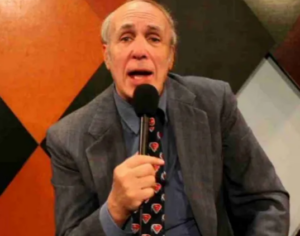The Controversial Release of Dolph Ziggler: Insights from Bill Apter
In September 2023, WWE made the surprising decision to release Dolph Ziggler, marking the end of an impressive nearly two-decade career with the company. Known outside WWE as Nic Nemeth, Ziggler’s release was met with considerable shock and speculation within the wrestling community.1
As a highly talented performer with a legacy that includes numerous accolades and a strong fan following, his departure raised questions about WWE’s decision-making process.
Table of Contents
The Talent and Legacy of Dolph Ziggler
Dolph Ziggler, whose real name is Nic Nemeth, has long been recognized for his exceptional in-ring skills and charismatic presence. His career in WWE spanned almost twenty years, during which he became known for his technical prowess, high-energy performances, and ability to engage the audience.
Ziggler’s contributions to WWE were not just limited to his wrestling abilities; he was also celebrated for his dedication to the craft and his work ethic.
Recognition by Legends
Even legends within the wrestling world, such as Ric Flair, have lauded Ziggler’s talent and performance. Flair, a 16-time World Champion and one of the most respected figures in professional wrestling history, has spoken highly of Ziggler’s skills.
The praise from such an esteemed figure highlights the high regard in which Ziggler was held by his peers and underscores the significance of his role in WWE.
The TNA World Championship and Nic Nemeth’s New Chapter
After his release from WWE, Dolph Ziggler transitioned to TNA (Total Nonstop Action Wrestling), where he adopted the ring name Nic Nemeth. In a notable turn of events, Nemeth captured the TNA World Championship by defeating Moose at the Slammiversary event.
This victory not only showcased his continued relevance in the wrestling world but also demonstrated his ability to thrive in a new environment. Nemeth’s success in TNA reaffirmed his status as a top-tier performer and highlighted his adaptability and resilience.
Also Read: Scottie Scheffler Response to Journalist: Golf is Too Easy for Me Now
Bill Apter’s Take on Nic Nemeth’s WWE Utilization and Success in TNA
Veteran wrestling journalist Bill Apter has been vocal about his views on Nic Nemeth, the former WWE star who now competes as Dolph Ziggler. Apter’s insights into Nemeth’s career suggest that WWE did not fully utilize his talents, despite the accolades and championship belts he earned during his time with the company.2
View this post on Instagram
Versatility and Talent
According to Apter, Nic Nemeth’s versatility and skill set were not fully leveraged by WWE. Nemeth’s in-ring abilities and charisma made him a standout performer capable of delivering high-quality matches against a wide range of opponents.3

Apter believes that WWE missed opportunities to showcase Nemeth’s full potential, which could have further enriched the company’s programming and storylines.
Commentary from The Wrestling Time Machine
In an episode of The Wrestling Time Machine, Apter elaborated on his views regarding Nemeth’s WWE tenure. He emphasized that, despite holding several championship titles, Nemeth’s talents were underutilized.
Apter’s comments highlight a common criticism within the wrestling industry: the challenge of balancing talent management with storytelling and character development.
Championship Belts vs. Full Utilization
- While Nemeth achieved notable success in WWE, including holding multiple championship belts, Apter suggests that these accomplishments did not fully reflect his capabilities.
- The discrepancy between holding titles and being utilized effectively is a point of contention for many wrestling fans and analysts.
- Apter’s perspective underscores a broader discussion about how WWE—and professional wrestling promotions in general—allocate opportunities and spotlight to their performers.
- Since his departure from WWE, Nic Nemeth has transitioned to TNA (Total Nonstop Action Wrestling), where he competes under his real name.
- Apter views Nemeth as a valuable asset for TNA, particularly during a period of significant change within the organization.
Bill Apter: A Pioneer in Wrestling Journalism
Bill Apter, born on October 22, 1945, is a prominent American journalist renowned for his extensive work in the field of professional wrestling. His journey into wrestling journalism began in the early 1970s, marking the start of a long and influential career.
Apter’s deep passion for wrestling and his keen eye for detail quickly established him as a significant figure in the industry.

Role in Wrestling Magazines
Bill Apter gained widespread recognition through his work with various fan magazines that covered professional wrestling. His most notable contributions were with Pro Wrestling Illustrated (PWI), where he played a crucial role both as a writer and a photographer.
PWI, along with other magazines such as The Wrestler and Inside Wrestling, became essential reading for wrestling enthusiasts and helped shape the industry’s media landscape.
Bill Apter did his one man show at @CACReunion one year and it was well worth the time
And maybe buy his book if you haven’t yet https://t.co/QXTa8nBYuz
— Referee Jared Hawkins (@RefJHawk) July 9, 2024
Impact on Pro Wrestling Illustrated
Apter’s association with Pro Wrestling Illustrated is particularly noteworthy. The magazine, under his editorial guidance, became one of the most respected and widely read publications in the wrestling world.

Apter’s behind-the-scenes access and in-depth interviews with wrestling stars provided fans with exclusive content and insights, helping to bridge the gap between the performers and their audience. His photographic work captured some of the most iconic moments in wrestling history, further cementing his place in the annals of wrestling journalism.
Contributions to Wrestling Coverage
- Apter’s work went beyond traditional journalism; he was also known for his storytelling ability and his knack for presenting wrestling narratives in an engaging manner.
- His coverage included not only match reports and interviews but also detailed profiles of wrestlers, in-depth analysis of wrestling trends, and coverage of major wrestling events.
- Bill Apter’s influence extended into the broader culture of professional wrestling. His magazines played a key role in promoting wrestling as a legitimate sport and entertainment genre.
- Apter’s articles often highlighted the athleticism, drama, and spectacle of wrestling, contributing to its growing popularity during a time when it was evolving rapidly.
- Even as the media landscape changed with the rise of digital platforms and social media, Bill Apter remained a respected voice in wrestling journalism.
- His knowledge and experience continued to be valued by fans and industry insiders alike. Apter’s contributions have been recognized through various honors and awards, and he remains an influential figure in the wrestling community.
Also Read: Jason Whitlock (Sports Journalist): Bio, Age, Career, Family, Net Worth 2024 and More
Bill Apter’s Career Beginnings with Stanley Weston
Bill Apter’s foray into professional wrestling journalism began in January 1970 when he started working for Stanley Weston, a prominent figure in the publishing industry.
Weston, known for his contributions to the wrestling and boxing magazine sectors, played a crucial role in Apter’s early career. This period marked the beginning of Apter’s long and influential journey in wrestling journalism.
Mentorship and Initial Roles
Stanley Weston not only provided Apter with his first professional opportunity but also served as a mentor during his formative years in the industry. Under Weston’s guidance, Apter honed his skills as a writer, reporter, and photographer.
Weston’s mentorship was instrumental in shaping Apter’s approach to journalism, providing him with the knowledge and experience needed to excel in the field.
Contributions to Wrestling and Boxing Magazines
During his tenure with Weston, Bill Apter contributed to several wrestling and boxing magazines that became staples in the industry. His work appeared in notable publications such as The Wrestler and Inside Wrestling.
These magazines, which were under Weston’s publishing umbrella, provided comprehensive coverage of wrestling events, profiles of wrestlers, and in-depth analysis of the sport.

The Wrestler and Inside Wrestling
- The Wrestler and Inside Wrestling were among the most influential magazines in professional wrestling during the 1970s and 1980s. Apter’s contributions to these publications included writing articles, conducting interviews, and capturing photographs of wrestling events.
- His detailed reporting and insightful commentary helped shape the narratives surrounding wrestling stars and events, providing fans with a deeper understanding of the sport.
- Stanley Weston’s influence on Apter extended beyond mere professional guidance. Weston’s emphasis on quality journalism and attention to detail became foundational principles in Apter’s work.
- The skills and techniques Apter learned under Weston’s mentorship laid the groundwork for his future successes in wrestling journalism.
- The experience Apter gained while working for Weston was pivotal in developing his career. The exposure to various aspects of journalism, including writing, reporting, and photography, equipped Apter with a diverse skill set that would later become his hallmark.
- His early work with Weston allowed him to build a reputation as a reliable and knowledgeable journalist in the wrestling world.
Sgt. Slaughter’s Family Reaction to Lacey Evans Using the Cobra Clutch
The Cobra Clutch, a wrestling maneuver famously associated with Sgt. Slaughter, has been a significant part of the wrestling world for decades. Sgt. Slaughter, a legendary figure in professional wrestling, popularized this move during his illustrious career.
The Cobra Clutch is not only a signature move of Slaughter’s but also a symbol of his impact on the sport.
Lacey Evans and the Cobra Clutch
In recent times, Lacey Evans, a current WWE Superstar, began using the Cobra Clutch as part of her wrestling repertoire. While Evans’ adoption of the move was seen by many as a tribute to Slaughter’s influence, it also raised some eyebrows, particularly within Slaughter’s family.
Sgt. Slaughter’s Daughter’s Reaction
During an exclusive interview with Bill Apter on Sportskeeda, Sgt. Slaughter revealed that his daughter had a strong reaction to Lacey Evans’ use of the Cobra Clutch. According to Slaughter, his daughter was not pleased with the fact that Evans did not seek permission or consult with Slaughter before incorporating the move into her wrestling arsenal.

Concerns About Respect and Legacy
Slaughter’s daughter’s discontent stems from a sense of respect and acknowledgment of the move’s origins. For many wrestlers and their families, there is a deep sense of pride and ownership over signature moves and their legacy.
The Cobra Clutch, being closely associated with Sgt. Slaughter, is a part of his wrestling heritage, and his daughter felt that proper respect should have been shown.
The Importance of Communication and Respect
The situation highlights a broader issue in professional wrestling regarding the use of signature moves and respecting the legacy of wrestling legends. Communication and acknowledgment play crucial roles in maintaining respect within the wrestling community.
While Lacey Evans’ use of the Cobra Clutch may have been intended as a homage, the lack of direct consultation with Sgt. Slaughter led to an emotional response from his family.
FAQ’S
1. Who is the 44-year-old talent released by WWE?
Ans: The 44-year-old talent recently released by WWE is a veteran wrestler who had been part of the roster. Identifying this individual helps understand their contributions to WWE and the impact of their departure.
2. What are Bill Apter’s main criticisms of WWE’s decision?
Ans: Bill Apter’s criticisms focus on his belief that WWE’s decision to release the 44-year-old talent was a significant error. His criticisms likely center on the talent’s experience, contributions to the company, and potential future value, arguing that their release could be detrimental to WWE.
3. What reasons might WWE have provided for the release?
Ans: WWE might have cited various reasons for the release, such as budget cuts, creative differences, a desire to refresh the roster, or other organizational strategies. Understanding WWE’s rationale provides context for the decision and Apter’s perspective.
4. How has the wrestling community reacted to the release?
Ans: Reactions from the wrestling community, including fans, fellow wrestlers, and industry insiders, vary. Some may support Apter’s view and express disappointment, while others might align with WWE’s decision or offer different opinions on the talent’s release.
5. What could be the impact of this release on WWE and the released talent?
Ans: The impact on WWE could involve changes in roster dynamics and potential backlash from fans. For the released talent, the impact includes seeking new opportunities, possibly joining other promotions, and adjusting to a new phase in their career. The release could also affect their reputation and future prospects in the wrestling industry.
Read More: Ariel Helwani (MMA Journalist): Who Is He? Bio, Wiki, Age, Career, Wife, Interview and More




